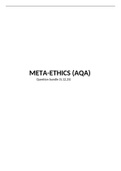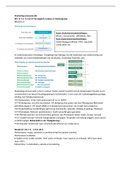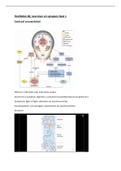Question bundle (5,12,25)
, MORAL REALISM
5-mark questions:
1. Moral cognitivism = moral statements express propositions (claims about a mind
independent reality) which are capable of being true or false
2. Moral non-cognitivism = Moral statements do not express propositions (are not
claims about a mind independent reality) are not capable of being true or false
3. Moral realism= The ontological belief that mind independent moral facts/properties
exist
4. Moral anti-realism= The ontological belief that mind independent moral do not
facts/properties exist
5. What is ethical naturalism?
a. Ethical naturalism is a meta ethical theory which claims that moral
statements are propositions (truth-apt), some such propositions are true,
these propositions are made true by mind independent moral facts/
properties, these mind independent moral facts/properties are identical to
natural non-moral features of the world. The first statement commits ethical
naturalism to moral cognitivism the belief that moral judgements are
cognitively meaningful, express propositions and make claims about a mind-
independent reality. The 3rd statement commits ethical naturalism to moral
realism, an ontological belief in the existence of mind-independent moral
facts/properties. Contra non-naturalism, naturalism claims that moral facts
are reducible/identical to natural (non-moral) features of the world. For
example, ethical hedonism claims that good is identical to happiness. Thus,
naturalists can be accused of failing to respect Hume’s law; that moral
judgements cannot be solely deduced from facts about the world and
advancing the idea that morality is not separate and distinct from the natural
world.
6. What is ethical non-naturalism?
a. Claims that moral statements are propositions truth apt, some such
propositions are true, these propositions are made true by mind independent
moral facts/properties, these mind independent moral facts are not reducible
to natural non-moral features of the world. 1. Commits ethical non
naturalism to moral cognitivism that the belief that moral judgements are
cognitively meaningful, express propositions and make claims about a mind
independent reality, 3. Commits ethical naturalism to moral realism, an
ontological belief in the existence of mind-independent moral facts. Contra
naturalism, non-naturalism claims that moral facts and properties are sui
generis and not identical to natural features of the world. For example, the
intuitionist G.E. Moore believed good is a basic, indefinable, non-natural
property that is known intuitively; good is good and that is the end of the
matter. Thus, non-naturalists respect Hume’s law; that moral ought
judgements cannot be solely deduced from facts about the world and
advance the idea that morality is separate and distinct from the natural world
(the autonomy of ethics)
, 7. Explain each of the philosophers’ theories about the origin of morality
a. Hobbes (reason)
i. Hobbes says that morality is based on rational self-interest (including
placing our interests above everyone else’s interests. He made the
social contract theory based on the state of nature condition of
human being prior to any social organisation, in this nature each of us
pursues what benefits us. He says that no one can expect anyone else
to do anything other than maximise their own self-interest = ‘a war of
every man against every man’. However, there would be no
advantages in this civilisation as everyone would live in continuous
fear and danger of violent death. A state of nature is bad for
everyone; therefore, it is rational to escape it, but the only way to
escape it is to follow rules which require co-operation between
people. Social contract is one which is agreed with moral principles
and government, rational for us to agree to these rules as long as
others do as well. It is rational for self- interested people to conform
to moral behaviour and sign up to a social contract to avoid being
harmed by other self- interested people. A social contract theory
shows the practical process by which reason brings about moral
principles as a kind of compromise. ‘we must follow the power of
reason, from the general rules determining it, right up to the point
where there springs from it the concept of duty”
b. Kant (reason)
i. Kant is a rationalist and says knowledge about the world was acquired
through the application of reason and moral knowledge would be
from the same. He argued that morality and moral principles have
their origin in reason and rational judgement was not based upon our
emotions or social upbringing. He said that we must determine what’s
wrong and right through application of reason and not a higher
authority (e.g. the government) trying to determine it for us. Reason
says that a morally right action is one that proceeds from the right
movie which is duty (disregards other motives such as emotions and
desires). Our duties can be determined by reason and through
understanding the categorical imperative e.g. universalizing maxims
underpinning actions and valuing other rational beings (not treating
them to a means to an end). Moral rationalism is when reason brings
us the understanding of the moral law, a standard which our actions
must comply to them. The moral law is not constructed by humans
but more discovered e.g., physical laws.
c. Hume (emotions)
i. Hume is an empiricist and believes the foundations of morality are in
the natural world and grounded in our human nature and psychology,







